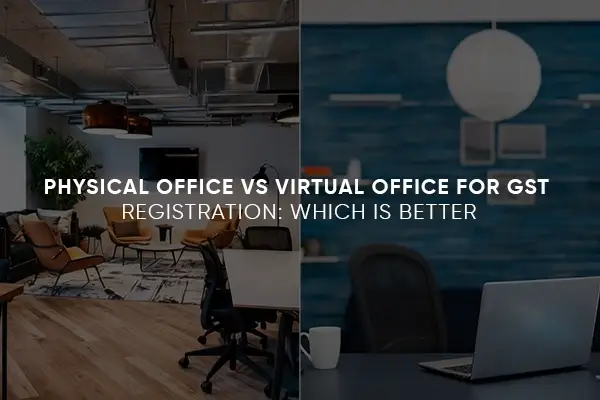Physical Office vs Virtual Office for GST Registration: Which Is Better
Obtaining Goods and Services Tax (GST) registration is mandatory for most businesses operating in India, requiring submission of a valid principal place of business address. Traditionally, companies have relied on physical office spaces to fulfil this criterion. However, with evolving business needs and cost considerations, virtual offices have emerged as a compelling alternative.
In this article, we compare physical offices and virtual offices for GST registration, helping businesses determine which option best suits their needs.
What Is a Physical Office for GST Registration?
A physical office is a leased or owned commercial space where business operations take place. The address of this office is submitted to the GST department as the principal place of business. This is the conventional approach and continues to be preferred by many established companies.
Key Characteristics:
- Actual physical workspace
- On-site employees and infrastructure
- Utilities and maintenance costs borne by the business
- Full control over premises and operations
What Is a Virtual Office for GST Registration?
A virtual office provides businesses with a legal business address without requiring a dedicated physical workspace. It typically includes a prestigious address, mail handling, and receptionist services. Businesses can operate remotely while using the virtual office address for official documentation, including GST registration.
Advantages of a Physical Office for GST Registration
- Tangible workspace: Ideal for businesses requiring a physical presence or frequent client interactions.
- Control: Full autonomy over office layout, security, and infrastructure.
- Brand Image: A dedicated office can enhance brand credibility in certain industries.
Advantages of a Virtual Office for GST Registration
- Cost Savings: Avoid high rental and maintenance expenses.
- Compliance Ready: Reputed providers offer all necessary documentation (NOC, rent agreement, utility bills) for GST registration.
- Flexible Terms: Monthly or quarterly plans adapt to business growth or downsizing.
- Professional Business Address: Access to prestigious addresses in top commercial hubs without heavy investment.
- Remote Work Enablement: Perfect for digital businesses, freelancers, and startups not needing a physical office.
Is a Virtual Office Legal for GST Registration?
Yes, as per GST guidelines, the principal place of business can be a virtual office address provided valid documentation is submitted. This includes a rent agreement or lease deed, a No Objection Certificate (NOC) from the property owner, and a recent utility bill. Many businesses now use virtual offices for GST registration to reduce costs while maintaining compliance.
When to Choose a Physical Office?
- Your business requires regular face-to-face meetings or client visits.
- You operate a large team requiring dedicated workspace and facilities.
- Your industry or clients expect a traditional office presence.
- You plan long-term stability in a fixed location.
When to Choose a Virtual Office?
- You are a startup or freelancer looking to minimise overhead costs.
- Your team operates remotely or is distributed geographically.
- You want to establish a presence in multiple cities/states without multiple leases.
- You seek flexible terms without long-term commitments.
Conclusion
Both physical and virtual offices have distinct advantages for GST registration depending on your business needs, budget, and operational style. While physical offices offer control and permanence, virtual offices provide cost-effective flexibility and professional credibility.
For many modern businesses, particularly startups and remote teams, virtual offices offer a superior solution for efficiently meeting GST compliance requirements. Choosing the right option ensures you remain compliant, professional, and focused on growth.
